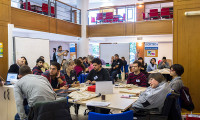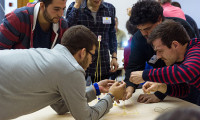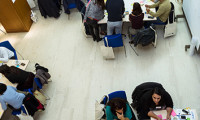The first co-creation workshop in Thessaloniki, within CIPTEC project, entitled: “Improving mobility in our city: we identify the major problems of public transport and seek for innovative solutions!” was held on 21st of October 2016. The workshop was organized by AUTh and took place at the new co-working space of OK!Thess initiative.
The co-creation workshop was opened by Prof. Aristotelis Naniopoulos, who welcomed the participants, introduced them at the CIPTEC project concept and invited them to submit their innovative ideas on the Greek crowdsourcing platform. Mr. Simon Bensasson, representative of the Municipality of Thessaloniki, which is the hosting body of the OK!Thess initiative also welcomed the participants and explained to them the objectives of the OK!Thess.
More than 30 participants from different backgrounds have attended the CIPTEC workshop and worked together towards the improvement of travel trips by Public Transport within the city of Thessaloniki. The main aim of the workshop was the investigation of innovative solutions for the major Public Transport problems.
At the beginning, four groups had been created and the participants broke the ice by playing the “Marshmallow challenge”. After that, the main problems of the Public Transport systems, within the city of Thessaloniki, were examined using the “Brainstorming method”. By exploiting the “Dot voting” method, the four most significant problems were recognized and analyzed in more depth in the next sessions. These problems were: (1) the overcrowded buses, (2) the road barriers that restrict the smooth flow of buses, (3) the lack of accessibility for disabled people both at the buses and the stations and (4) the pricing and payment systems related problems.
During the next session, the “Conceptual mapping method” and the “World café method” were used in order for the participants to explore innovative solutions for the aforementioned problems. The first method required the description of innovative solutions being illustrated in different ways e.g. images, sketches, words, etc. During the second technique participants were able to move freely to any discussion table, expressing their own opinions and ideas for each one of the problems under consideration. In fact, a large number of solutions was resulted and participants assessed them using the “Two dimensional axis” method. Especially, they evaluated the solutions considering the feasibility (technical, operational, financial, legal, etc.) of each one of them and their potential towards increasing the Public Transport modal share.
The last session included the creation of a business model for the two most promising innovative solutions, as they were resulted from the session above. These solutions were: the implementation of a smart electronic ticketing system within the city of Thessaloniki and (2) the creation of a mobile application indicating how much overcrowded the vehicles are. Each one of the solutions above has been analyzed considering both the side of passengers and the side of operators and finally participants presented their business models at the plenary session.
At the end of the workshop, participants were asked to fill-in a workshop assessment questionnaire about the whole organization of the event, the materials provided, the quality of moderation etc. To sum up, not only were the participants highly gratified from the results of the workshop, but they were also enjoyed the co-creation character of the workshop and its organization as a whole.



